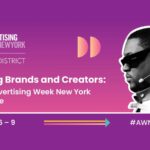The most sustainable rebrands will future-proof companies against short-sighted strategies.
By David Brier, CEO and Founder, Rising Above The Noise
At the start of a rebrand, there’s one piece of advice that I’ve used to create unicorn brands: “Ignore what people say. Look at what they do and you’ll learn what’s in their hearts and not be misled by hearing something you wanted to hear.”
Cutting Through the Noise in 2024
In a world bombarded with regurgitated brand messages and everything AI, there’s a new era of companies emerging that’s ready to radically combat this sea of sameness: embrace ignorance.
Not the ignorance of blissful unawareness, but the strategic ignorance that prioritizes observation over conversation.
It’s why quirky can outperform logic (take Liquid Death as a prime example).
And why Dollar Shave Club, a brand built on humor, convenience, and affordability, offered monthly subscriptions for razors and other grooming products, and raised $1 billion after its acquisition by Unilever.
This is about watching consumer behavior rather than listening to their often-misleading words.
As ad legend David Ogilvy said, “We prefer the discipline of knowledge to the anarchy of ignorance” and nothing is more ignorant than doing research only to confirm your predetermined inclinations.
Community is the New Currency
Seth Godin said, “People do not buy goods and services. They buy relations, stories, and magic.”
This truth is the cornerstone of the rebranding revolution.
Because people like to be part of a winning brand that shares their value.
Take for example Red Bull. Their early marketing was a fizzling dud. That’s right, flat as yesterday’s soda.
They were nothing in the market.
So how did they turn anonymity into ubiquity with a stroke of genius?
They strategically placed used, empty, and crushed Red Bull cans in trash bins around London’s nightclubs and popular nightlife spots.
This tactic created the illusion that Red Bull was a popular choice among the trendy, nightlife crowd.
This created an aura of popularity, as if to say, “Red Bull isn’t just an energy drink; it’s the lifeblood of the night.”
This illusion created the impression of a community that contributed to their whopping 43% global market share, proving that a brand isn’t just what you sell, it’s the story you tell and the community you build.
It was a bold move, a gamble in its own right, but it’s what separates the memorable from the forgettable.
Most importantly, Red Bull looked first at what qualities conveyed popularity, and then filled in the blanks to tell that story themselves, closing the gap between the future and the present.
Customer Experience Over Advertised Promise
Gary Vaynerchuk’s street smarts tell us that the game has changed. It’s no longer about who shouts the loudest; it’s who provides the most immersive experience.
Future-forward companies create ecosystems where customers don’t just buy a product; they step into a world tailor-made for them.
For example, Old Spice was traditionally seen as a brand for an older generation. This all changed around 2010.
Old Spice redefined its image with a series of quirky and humorous advertising campaigns featuring Isaiah Mustafa. The most notable was the “The Man Your Man Could Smell Like” campaign.
Its witty script and unconventional approach dramatically altered the brand’s image and appealed to a younger demographic transforming Old Spice from a dated brand to one synonymous with humor, virality, and the ingenuity to be adaptable and reinvent itself.
Similarly, Dove was primarily known as a simple, moisturizing soap brand through 2004.
With the launch of the “Real Beauty” campaign, Dove reconnected itself with its community by looking first and asking questions later.
Dove redefined its image and mission featuring women of all shapes, sizes, and ethnicities, challenging the traditional norms and stereotypes of beauty propagated by the beauty industry.
This move was unorthodox in a market dominated by idealized images of beauty promoting body positivity and self-esteem, significantly elevating its status and appeal in the market.
The Power of Being Ignorant
This is why rebranding today is so much more than slapping on a new logo; it’s about rewriting the script of customer interaction like Red Bull did above.
The art of ignorance in rebranding isn’t about turning a blind eye.
It’s about focusing on the right things – actions over words, authenticity over pretense, and experiences over advertisements.
As we usher in a new year, this wave of companies and how they reinvent themselves is not just rebranding their products, identities, slogans and narratives.
They are rebranding what it means to be a brand.
About the Author
Bestselling author of Brand Intervention and Google’s #1 ranked rebranding expert, David Brier’s rebrands have generated over $7 billion worldwide.
One of Google’s top-ranked rebranding expert, David’s four decades of branding expertise are sought after by companies of all sizes and celebrated by the elite of brand building like Daymond John who calls him “brilliant with branding.”
In addition to David’s work being featured in ADWEEK, Fast Company, Forbes, INC, Huffington Post, Entrepreneur, Thrive Global, the New York Times and numerous blogs and podcasts the world over, he is the recipient of over 320 international awards including the rare honor of being presented the Presidential Ambassador for Global Entrepreneurship medallion.








